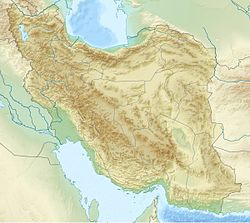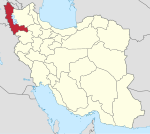Oshnavieh
اشنویه | |
|---|---|
City | |
| Coordinates: 37°02′11″N 45°05′44″E / 37.03639°N 45.09556°E[1] | |
| Country | Iran |
| Province | West Azerbaijan |
| County | Oshnavieh |
| District | Central |
| Government | |
| Population (2016)[2] | |
• Total | 39,801 |
| Time zone | UTC+3:30 (IRST) |
Oshnavieh (Persian: اشنويه)[a] is a city in the Central District of Oshnavieh County, West Azerbaijan province, Iran, serving as capital of both the county and the district.[5]
Oshnavieh County is bordered by Naqadeh County to the east, by Piranshahr County to the south, by Urmia County to the north, and by Iraqi Kurdistan Province to the west.[6]
History
Oshnavieh lies on the historic route from Urmia basin to Rawandiz over the Kalashin Pass. An Urartian stele from about 800 BCE exist near the city. After the Mongol invasion, the city became the seat of the Nestorian Church for a brief moment.[7]
Medieval geographers from the 10th century wrote that the city was fair-sized, attached to Urmia, fertile and having good pasture. Kurds from the Hadhabani tribe would settle in the area during the summer, pasture their livestock and sell their products for manufactures and textiles from the city. The city came under the rule of the Rawadids in the 10th century and continued to flourish. The city also fostered scholars and traditionalists.
Ali ibn al-Athir wrote in 1205/6 that Nusrat al-Din Abu Bakr of the Eldiguzids handed over the city to the ruler of Maragheh ʿAlāʾ-al-Din Qara Sonqor. In 1226, the city was under the Ivāʾiya Kurds until its capture by Jalal al-Din Mangburni. In 1220/1, when Yaqut al-Hamawi passed the city, the city was in ruins, but had been rebuilt by the time of the visit of Hamdallah Mustawfi. Mustawfi described the city as being Sunni, in a rural district of 120 villages and producing a total revenue worth 19,300 dinars annually. It was mentioned by traveller Fraser in 1840 that the city was populated Zerza Kurds, whose presence is possibly attested as being present in the city as early as the 14th century.
In the 19th century, the population was mostly Kurdish with a small population of Assyrians which perished during the Sayfo.[7]
When Sheikh Ubeydullah and his forces advanced from Ottoman Hakkari towards Urmia, he captured Oshnavieh and made it his capital until he was defeated in 1880.[8]
20th century
The town was incorporated into the short-lived Republic of Mahabad in 1946.[9]
Mahsa Amini protests
Protesters briefly took over the city during the Mahsa Amini protests, from 24 to 25 September 2022.[10]
Demographics
Language and ethnicity
The city is populated by Kurds who speak Sorani.[11]
Population
At the time of the 2006 National Census, the city's population was 29,896 in 6,572 households.[12] The following census in 2011 counted 32,723 people in 8,149 households.[13] The 2016 census measured the population of the city as 39,801 people in 10,667 households.[2]
See also
Notes
References
- ^ OpenStreetMap contributors (27 September 2024). "Oshnavieh, Oshnavieh County" (Map). OpenStreetMap (in Persian). Retrieved 27 September 2024.
- ^ a b Census of the Islamic Republic of Iran, 1395 (2016): West Azerbaijan Province. amar.org.ir (Report) (in Persian). The Statistical Center of Iran. Archived from the original (Excel) on 30 August 2022. Retrieved 19 December 2022.
- ^ Oshnavieh can be found at GEOnet Names Server, at this link, by opening the Advanced Search box, entering "-3077462" in the "Unique Feature Id" form, and clicking on "Search Database".
- ^ "لە کوێستانەکانی شنۆ شەڕ لەنێوان سوپای پاسداران و گرووپێکی نەناسراو روویدا" (in Kurdish). 9 June 2018. Retrieved 21 March 2020.
- ^ "Oshnavieh city, West Azerbaijan - ITTO".
- ^ a b Bosworth, C. E. (2002). "OŠNUYA". Encyclopedia Iranica.
- ^ Maisel, Sebastian (2018). The Kurds: An Encyclopedia of Life, Culture, and Society. ABC-CLIO. p. 234.
- ^ Hamza, Ahmed Y. (2020). "A Contemporary Political History of the Kurds in Iran". In Gürses, Mehmet; Romanoa, David; M. Gunter, Michael (eds.). The Kurds in the Middle East: Enduring Problems and New Dynamics. p. 213.
- ^ Murphy, Matt (25 August 2022). "Iran protests: Raisi to 'deal decisively' with widespread unrest". BBC.
Locals told the BBC that demonstrators had seized control overnight and that security forces and government officials had fled, before regaining control on Saturday.
- ^ Mosel, Ulrike (2018). "Fieldwork and community language work". Essentials of Language Documentation. De Gruyter. p. 17. doi:10.1515/9783110197730.67.
- ^ Census of the Islamic Republic of Iran, 1385 (2006): West Azerbaijan Province. amar.org.ir (Report) (in Persian). The Statistical Center of Iran. Archived from the original (Excel) on 20 September 2011. Retrieved 25 September 2022.
- ^ Census of the Islamic Republic of Iran, 1390 (2011): West Azerbaijan Province. irandataportal.syr.edu (Report) (in Persian). The Statistical Center of Iran. Archived from the original (Excel) on 20 January 2023. Retrieved 19 December 2022 – via Iran Data Portal, Syracuse University.










